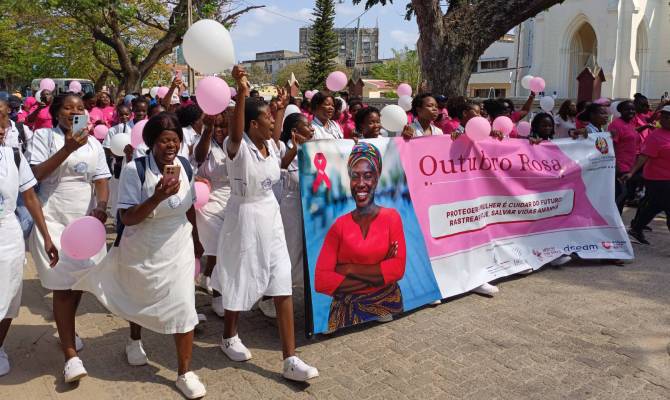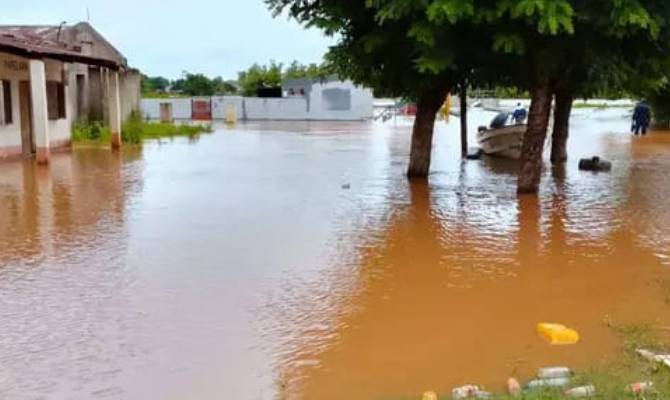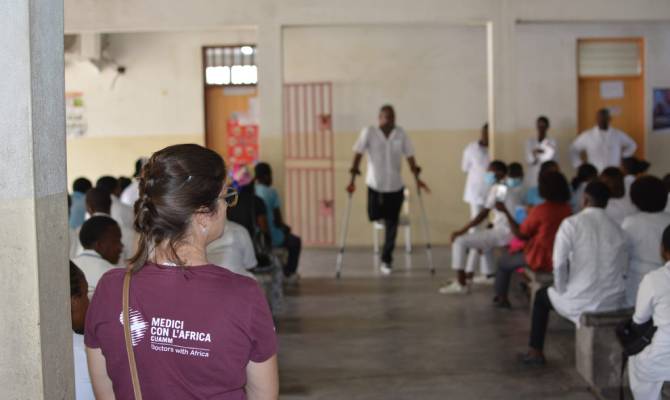All over the world October is coloured pink to raise awareness in the community, particularly among women, of the importance of prevention in the fight against female cancers, specifically breast and cervical cancer. Doctors with Africa CUAMM is also reinforcing its commitment, participating in this international movement and reminding us how crucial it is to be properly informed and prevented.
According to the World Health Organisation, in 2021 breast cancer became the most common cancer globally, accounting for 12 per cent of all new annual cancer cases worldwide. Furthermore, cervical cancer globally accounts for 6.5 per cent of all female cancers, and more than a third of deaths from this cancer globally occur in sub-Saharan Africa, although the region accounts for only 14 per cent of the world’s female population.
With each passing year in the countries where CUAMM works, more and more people know that October is an important month. In Mozambique, for example, the health authorities have again mobilised this year to involve communities in awareness-raising and prevention activities. In particular, in the health units where CUAMM promotes the “Prevention and Control of Non-Communicable Diseases” project, financed by the Italian Agency for Development Cooperation, there is a lot of excitement, and preparations began some time ago. An event has been organised in each of the three regions in which the project promotes its activities – Sofala, Maputo and Zambezia – attended by authorities and the media in order to convince as many women as possible to go for screening. During the day, information leaflets are distributed and activists and nurses gather women into small groups and explain what prevention and treatment consist of.
In the health units, screening activities are intensified to try to reach as many women as possible. Every morning, the nurses organise a special awareness-raising programme and screen all volunteers. The turnout is always very high and the nurses only stop working after all the women, neatly queued up, have been examined.

Today, at the end of the working day in the small rural health centre in Lamego, Sofala Region, a CUAMM nurse came to meet Mrs Julieta, who had visited a short while before. She wanted to thank her. Julieta, 47, had heard community activists talking near her home a few days ago about the importance of screening. Although she had had a pain in her abdomen for some time, it had taken her a long time to decide to go to the health centre. It is not a short walk and there are always many chores to do at home. Eventually she made up her mind and, having arrived at the health centre in Lamego after attending one of the awareness-raising events that the nurses organise in the mornings, all doubts were gone: going to the health centre was the right choice.
«I can’t hide the fact that, on going to the health centre, I was afraid, but after listening to the nurse’s advice, I didn’t hesitate for a moment to get in line for the screening». They found a lesion in her uterus greater than 75 per cent and she will have to go to the hospital in Nhamatanda, 15 kilometres from the health centre.
«The nurses at the health centre have already made the appointment for me and with the savings I have I will take the bus and go to the hospital and then come back here to the health centre to do the follow-up. Despite finding out that I have to have surgery, I am happy. They explained my condition well and I have the possibility of treatment. That’s why I really wanted to say thank you».
Mrs Julieta is one of the many women who have accessed the services offered by the project. Since it began, 87,900 women have been screened, many of them HIV-positive. And thanks to the tireless work of the nurses, 4,270 women have been treated with cryotherapy and 1,950 have been referred to a hospital where they can be observed and treated by specialised medical personnel.







